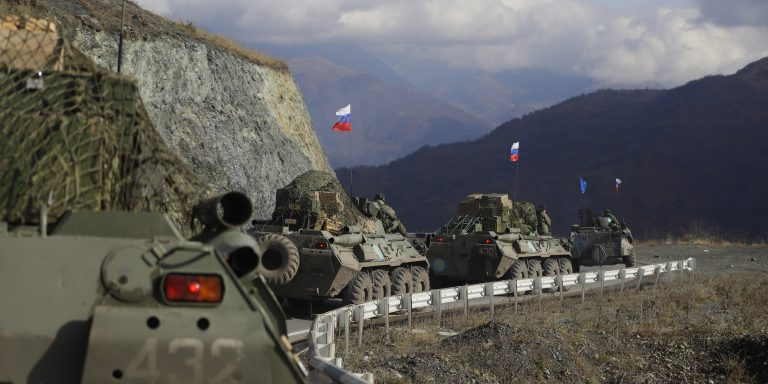
A number of flashpoints around the globe could spiral from minor border skirmishes into full-blown conflagrations that could drag their broader regions into conflict.
Given the tectonic shifts in the international system and renewed focus on great power competition, the prospects of inter-state warfare are now receiving more scrutiny.
Several other border conflicts have received less attention but still could lead to significant clashes if left unresolved, including Nagorno-Karabakh, Cyprus, Western Sahara, and Lebanon.
Many of these border disputes are in areas where economic stakes are high—the eastern Mediterranean is energy-rich, while the South Caucasus is a region with significant oil and natural gas infrastructure.
While the international community has been focused on preventing further escalation of the war in Ukraine since Russia’s February 2022 invasion, other flashpoints around the globe should not be ignored. Numerous border conflicts around the globe have potential to spiral from skirmishes into full-blown conflagrations. These conflicts vary by geography, the strength of the adversaries involved, and historical context. Even where conflicts appear “frozen,” longstanding tensions and disputed claims could resuscitate the fighting. Geopolitics can intervene, too, as is the case with Brexit’s potential impact on the border between Northern Ireland and the Republic of Ireland.
Given the tectonic shifts in the international system and renewed focus on great power competition, the prospects of inter-state warfare are now receiving more scrutiny. Two of the world’s geopolitical heavyweights—China and India—have sparred over border issues both historically and more recently. In mid-December, hundreds of Indian and Chinese troops clashed in the northeastern Indian state of Arunachal Pradesh along a long-disputed, ill-defined borderline known as the Line of Actual Control. The fighting resulted in injuries on both sides, though no deaths were reported. It was the worst such skirmish since the summer of 2020, when a deadly clash in the Galwan Valley led to the death of at least twenty Indian and four Chinese soldiers, in what was perhaps the most significant border escalation since two separate incidents in the 1960s between the two countries. A map published by the Chinese government in April generated opprobrium from the Indian government, as it showed Arunachal Pradesh as formally part of China (Beijing claims this area as “southern Tibet”). India has other border disputes on its periphery. Just last month, in a part of Kashmir fought over between India and Pakistan, the Pakistani military accused Indian troops of opening fire and killing a civilian in violation of the ceasefire agreement. Many analysts believe that tensions between the two nuclear-armed nations present one of the world’s gravest threats for nuclear conflict, though Russia’s saber-rattling amid the Ukraine war has certainly added fodder to that discussion.
Several other border conflicts have received less attention but still could lead to significant clashes if left unresolved. In Nagorno-Karabakh, another territory where borders are in dispute, what was a frozen conflict turned hot as recently as 2020, when Armenia and Azerbaijan fought a second war over the territory. Though internationally-recognized as Azerbaijani, the population of Nagorno-Karabakh is largely ethnically Armenian. Just this week, Armenia accused Azerbaijan of once again mobilizing its troops along the region’s border, while an Azerbaijani blockade has been cutting residents off from food and medicine for eight months. Azerbaijan and Armenia continue to fight over the territory, with Türkiye backing Baku and Russia supporting Yerevan.
Meanwhile, in the Mediterranean, Turkish Cypriot forces recently assaulted UN peacekeepers operating in Pyla, a village located along the so-called “Green Line,” or buffer zone that separates the Republic of Cyprus from the Turkish Cypriot territory to its north. The fighting, which required the hospitalization of three peacekeepers, broke out as Turkish Cypriot authorities attempted to construct a road on the island without authorization from the UN, which has had a peacekeeping mission on Cyprus for nearly six decades.
Disputed territory in the Western Sahara remains a major source of tension between Morocco and Algeria, the latter of which backs the self-declared Sahrawi Arab Democratic Republic that controls about twenty percent of the territory. The border between Algeria and Morocco has been closed since 1994, while Rabat and Algiers have not had diplomatic relations since Algiers formally cut them off in August 2021. In Lebanon, the United Nations peacekeeping force known as UNIFIL had its one-year mandate renewed just last week, leading some to speculate that the ongoing border dispute centered around the village of Ghajar could be ameliorated. Israel, which has controlled the village in its entirety since its 2006 war with Hezbollah, has complained over the summer about tents erected in the area by the Lebanese militant group. More broadly, the confluence of disputed territory between Lebanon, Syria, and Israel is yet another flashpoint in what could become a multi-front conflict for Israel, which has been battling Palestinian militants in the West Bank and Gaza.
Many of these border disputes are in areas where the economic stakes are high—the eastern Mediterranean is energy-rich, while the South Caucasus is a region with significant oil and natural gas infrastructure. Other disputes are in regions with historical animosities, so even a seemingly innocuous incident could spark more intense fighting. As the international system shifts to a more multipolar posture, countries like the United States, China, Russia, Türkiye, Iran, and others are supporting proxies and intervening in states, regions, and territories where border conflicts are rife. These conflicts are in many ways escalated by immigration and refugee flows, including those seeking to escape war, poverty, or climate-related natural disasters. Avoiding escalation will require sustained diplomacy and the cooperation of great powers, which seems unlikely in the current geopolitical environment. Viewing border disputes through the zero-sum lens of great power competition could make conflict in some of these flashpoints inevitable, a precarious situation that could grow more dire over time.
